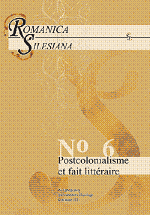Espressivismo linguistico e culturale in "Oltre Babilonia" di Igiaba Scego
Linguistic and Cultural Expressionism in Igiaba Scego's Novel "Oltre Babilonia"
Author(s): Joanna JanuszSubject(s): Literary Texts
Published by: Wydawnictwo Uniwersytetu Śląskiego
Keywords: Postcolonial literature; expressionism; episodic structure; neologism; language hybridism
Summary/Abstract: Postcolonial literature, which did not appear in Italy until the 1980s, started to flourish in that country in the early 1990s. Although it originated there and draws on Italian historic colonial experiences, it can be understood as a way of emphasising the linguistic and cultural separateness of Italian-speaking authors originating from former Italian colonies in Africa (i.e. Libya, Somalia and Ethiopia). It appears that a country like Italy, which has been deprived of its homogeneity and linguistic and cultural cohesion, is particularly susceptible to the absorption of traditions and languages from outside. Postcolonial literature, which at its very basic level is a hybrid, cannot be pushed into the framework of one convention or tradition. On the contrary, it fits well into the mainstream of non-canonical, avant-garde and expressionistic literature that has been present since Dante. Igiaba Scego, the author of Oltre Babilonia, published in 2008, belongs to the generation of young Italian writers of African origin. The article aims to analyse the novel in terms of writing techniques defined as expressionistic at the level of surface, typology of characters and linguistic and stylistic features.
Journal: Romanica Silesiana
- Issue Year: 2011
- Issue No: 6
- Page Range: 246-262
- Page Count: 17
- Language: Italian

